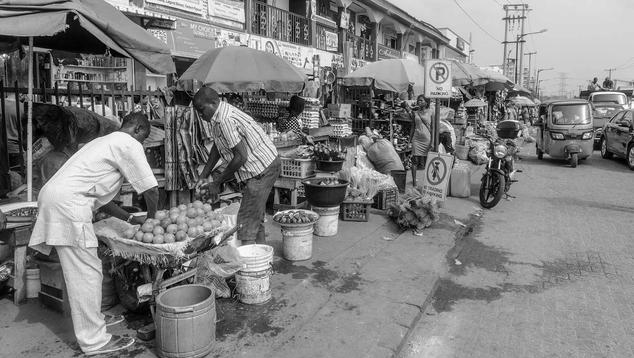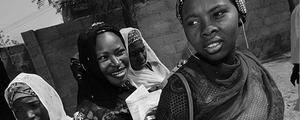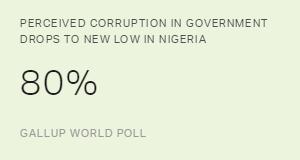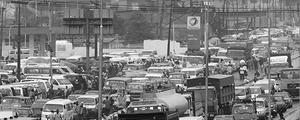Story Highlights
- 53% of Nigerians say it's a bad time to find a job locally
- 45% say their local economies are getting better
- 71% report not having enough money for food at times
WASHINGTON, D.C. -- Nigerians are mixed on a key issue that will be on many of their minds as they vote this weekend -- the economy. While they are just as pessimistic about their local job market as they were prior to the last election, with 53% saying it is a bad time to find work, they are more optimistic about where their local economies are headed.
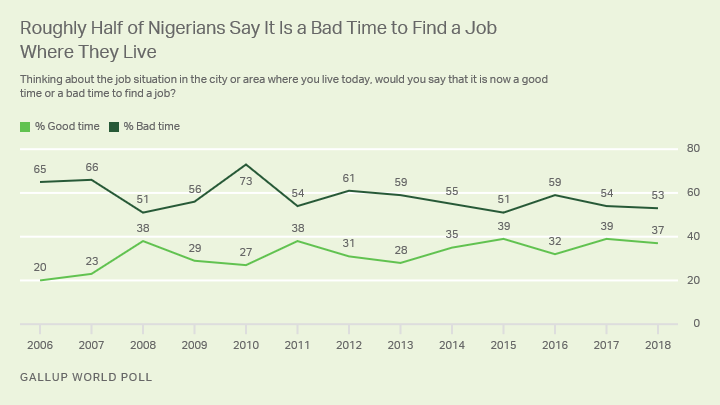
These latest data come from a survey conducted from May 14-June 2, 2018, as Nigerians were still struggling to recover from one of the worst recessions to hit the country in 25 years. While Nigeria exited recession conditions in 2017, economic growth has remained sluggish, with the World Bank estimating that the country's economy would grow less than 2% in 2018.
At the height of the recession in 2016, 32% of Nigerians said it was a good time to find a job where they lived, while 59% reported it was a bad time. It has improved modestly since then.
Nigerians are relatively more optimistic about the future of their local economies. Currently, nearly half of Nigerians (45%) say their local economy is getting better, which is substantially higher than 34% who said the same in 2016 and up seven percentage points from 2014, prior to the last election.
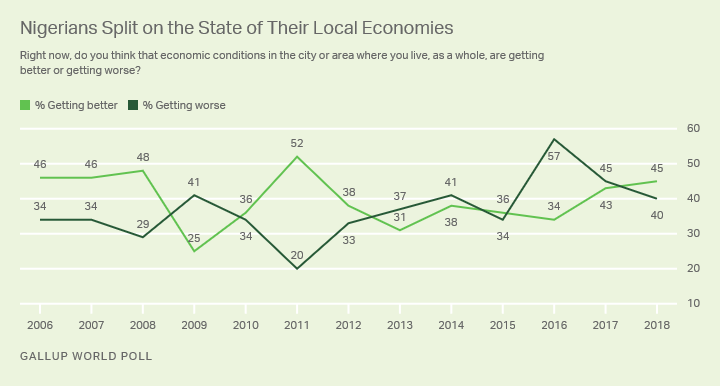
Many Nigerians Still Struggle With Access to the Basics
Even with their positive outlook, more Nigerians today are struggling with the basics than they have in recent years. Seven in 10 Nigerians -- the highest percentage in a decade -- report they did not have enough money to buy food at some point in the past year. This is up 13 percentage points since the depths of the recession in 2016. This spike in Nigerians lacking money for food is likely due to increased inflation in the price of food in recent years. Prices of food climbed more than 13% from 2017 to 2018 alone.
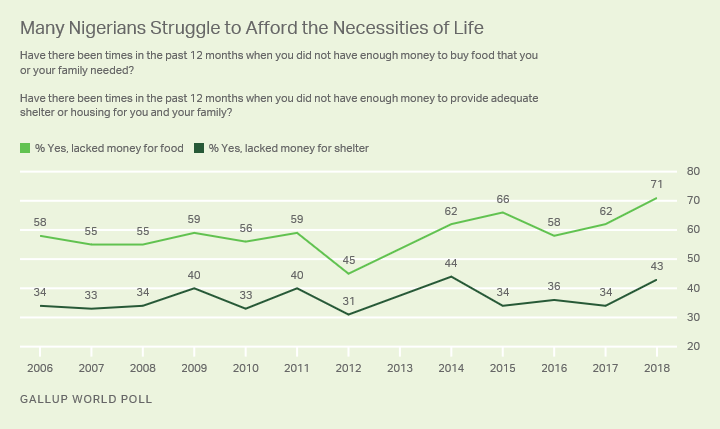
Additionally, 43% of Nigerians struggled to afford adequate shelter in the same time, which is also up since the recession, but more modestly. The current level is still near the record high of 44% in 2014.
In Addition to Economic Sluggishness, Security Concerns Remain
As part of his election campaign in 2015, President Muhammadu Buhari promised to defeat the Boko Haram militant group, as well as improve Nigeria's economy. After Buhari took office in 2015, Nigerians' confidence in their military, and likely by extension their confidence in the military's ability to defeat Boko Haram, jumped to 74%, up from 61% in 2014. Nigerians' confidence in their military has largely plateaued, with little change since.
This increased confidence in the military to address the Boko Haram threat is also reflected in other Gallup data. Fifty-nine percent of Nigerians said the government was doing enough to fight terrorism in 2017, compared with 26% in 2014. Additionally, in 2017, Nigerians ranked addressing terrorism last behind the economy and corruption as issues for their government to address over the next 12 months.
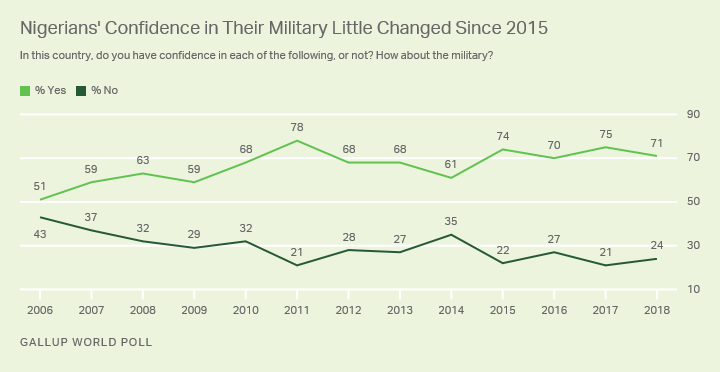
Buhari's efforts to counter Boko Haram are generally credited with having achieved some success. However, Nigerians' confidence in the military has not changed substantially since his election. The last time Gallup asked about the threat posed by Boko Haram in 2017, 80% still identified it as a major threat. While this is down from the 95% who said this in 2014, it still demonstrates lingering concern in the minds of Nigerians, which is at least partially justified given the group's recent resurgence.
Bottom Line
During his inauguration in 2015, Buhari promised to bring "increased prosperity" to Nigeria, as well as counter corruption and defeat Boko Haram. However, the years since his election have been beset by economic difficulties. Continued economic sluggishness remains the primary issue for Nigerian voters this election cycle, and Buhari reportedly admitted the country's economy was in "bad shape" in a meeting with government officials late last year. The "bad shape" of the Nigerian economy is reflected in that more than half of Nigerians say it is a bad time to find a job where they live.
Buhari's chief opposition for a second term, Atiku Abubakar, has attempted to capitalize on the lack of economic growth to make the case he should be the next president of Nigeria. Abubakar has claimed that his past business success would position him well to address the lingering economic issues which face Nigeria. The lack of economic growth is a clear area of weakness for Buhari.
However, Abubakar's efforts to gain traction on Buhari in the presidential race may be moot. Buhari was recently endorsed by 71 Nigerian military officers. Additionally, Buhari has also moved to suspend the country's most senior judge, who would have been in a position to rule on any disputes in the election.
Regardless of which of the 78 candidates for Nigeria's presidency wins, it does not appear that the country's economic woes will be eased anytime soon. The Nigerian government has announced that it only expects the country's economy to grow by a modest 3% in 2019.
Learn more about how the Gallup World Poll works.
For complete methodology and specific survey dates, please review Gallup's Country Data Set details.
